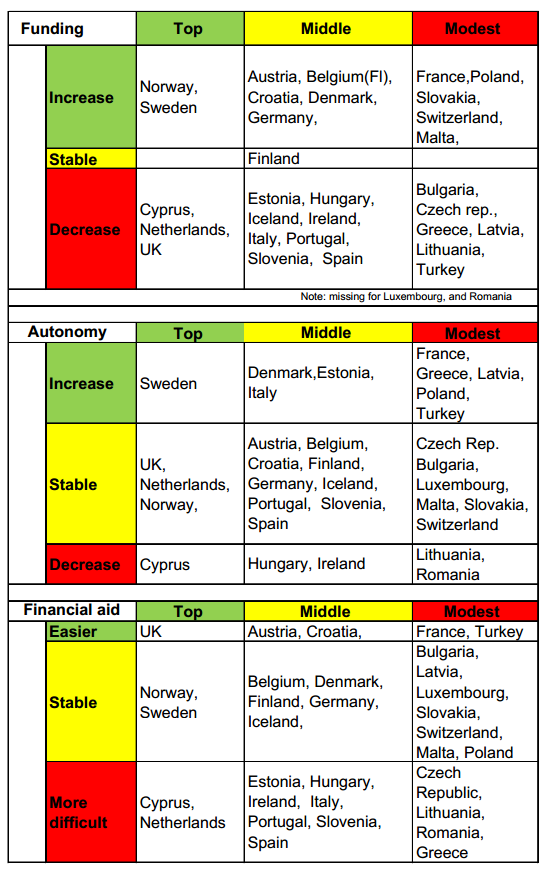Where the cuts hurt most

“Highly performing universities are a boost for Europe’s competitiveness in a
global knowledge economy”, say researchers of Empower European Universities (EEU). Europe’s declining demographics make highly performing universities all the more necessary. And the current economic downturn presents even more of challenge to Government policy. “Universities may have considerable potential to help countries to grow out of the crisis.”
In a recent policy report, the authors state: “Universities will increase their performance if they are ‘empowered’. Empowerment expresses the room provided by national policies (in the form of sufficient resources and an appropriate regulatory environment) to tailor their contribution to the need of the economy.”
The importance of autonomy
According to the report the most effective determinant of educational quality
is policy autonomy. “Policy autonomy allows faculties to choose their teaching methods and curricula in order to best meet the learning needs of students.
Policy autonomy is a much more influential determinant of educational quality than the amount of public financing, and suggests that quality education is not only achievable by the countries which make a substantial funding effort provided that the governance structure is strong enough.”
HE-funding, a must for economic growth
A general trend in a majority of countries is the reduction of public funding in higher education, with some uncertainty on compensation through a commensurate increase in private finance. “Seventeen European Governments have reduced their public budgets for higher education, thirteen restricted financial aid programs for students, and five have restricted autonomy since 2008. This recent reduction is however not entirely crisis related. It may have intensified, but is not disconnected from longer-term trends of reduction of public funding in higher education. These reductions are likely to have lasting consequences on the higher education sector in Europe as well as on innovation and on national competitiveness, unless matched by private sources of funding.”
“At the same time, the Governments of twelve countries have recognised that proper funding of higher education is a must for economic growth. The Swedish Government is continuing a policy of generous funding to higher education and had minor increases in autonomy in 2009, while sustaining generous financial aid policies. The Danish Government also maintains its commitment for higher education in a long-term strategy.”
Increasing accessibility
“Around nine governments have or are adopting measures to increase the autonomy of universities. In Italy, Turkey, Greece and Latvia, these measures go together with funding cuts, while in Sweden, Denmark, France and Poland, the increase in autonomy has been accompanied by increases in public funding. Only five Governments have adopted measures to increase accessibility to higher education, namely Austria, France and Turkey, while reduction in financial aid schemes are taking place in thirteen other countries.”
“For example, Hungary has had a reduction of the number of state funded places of 40%. The introduction of a student loan scheme with interest 31 subsidies (student loan II), may not be sufficient to compensate for the drastic impact of these reductions. The jury is still out on the UK which increased tuition fees substantially while at the same time expanding financial aid in a student loan scheme. Whether equity will change as a result, remains to be seen.”

Meest Gelezen
Vrouwen houden universiteit draaiende, maar krijgen daarvoor geen waardering
Hbo-docent wil wel rolmodel zijn, maar niet eigen moreel kompas opdringen
‘Sluijsmans et al. slaan de plank volledig mis’
Wederom intimidatie van journalisten door universiteit, nu in Delft
‘Free riding brengt het hoger onderwijs in de problemen’

